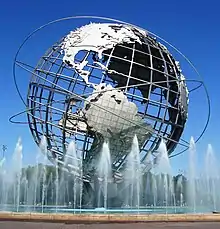Hollis, Queens
Hollis is a residential middle-class neighborhood within the southeastern section of the New York City borough of Queens. While a predominantly African-American community, there are small minorities of Hispanics and South Asians residing in the area. Boundaries are considered to be 181st Street to the west, Hillside Avenue to the north, Francis Lewis Boulevard to the east, and Murdock Avenue to the south. Hollis is located between Jamaica to the west and Queens Village to the east.
Hollis | |
|---|---|
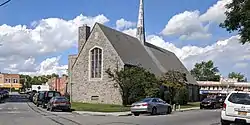 St. Gabriel's Hollis Episcopal Church | |
Location within New York City | |
| Coordinates: 40.71°N 73.76°W | |
| Country | |
| State | |
| City | New York City |
| County/Borough | Queens |
| Community District | Queens 12[1] |
| Population | |
| • Total | 20,269 |
| Ethnicity | |
| • Black | 64.0% |
| • Asian | 10.7% |
| • White | 2.3% |
| • Native American | 0.6% |
| • Hispanic | 13.2% |
| • Other/Multiracial | 9.1% |
| Time zone | UTC−5 (EST) |
| • Summer (DST) | UTC−4 (EDT) |
| ZIP Codes | 11412, 11423 |
| Area codes | 718, 347, 929, and 917 |
| Website | www |
Hollis is located in Queens Community District 12 and its ZIP Codes are 11423 and 11412.[1] It is patrolled by the New York City Police Department's 103rd Precinct.[3] Politically, Hollis is represented by the New York City Council's 23rd and 27th Districts.[4]
History
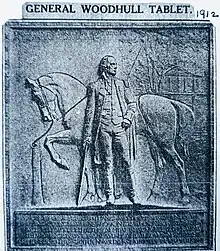
The first European settlers were Dutch homesteaders in the 17th century. A century later, early in the American Revolutionary War, it was the site of part of the Battle of Long Island, a battle in which the revolutionary Brigadier General Nathaniel Woodhull was captured at a tavern on what is now Jamaica Avenue. Woodhull Avenue in Hollis is named after him.[5] The area remained rural until 1885, when developers turned 136 acres (55 ha) into houses, and the area is still developed primarily with single-family houses.[6] In 1898, it became a part of New York City with the western towns of Queens County.[7][8] Since the end of the Korean War, the neighborhood has been settled primarily by African-American families.[9] In recent years, the area has seen a large influx of South Asians and West Indians. The area has a majority of working parents with many early childhood schools in Hollis.
Demographics
Based on data from the 2010 United States Census, the population of Hollis was 20,269, a decrease of 478 (2.3%) from the 26,061 counted in 2000. Covering an area of 525.10 acres (212.50 ha), the neighborhood had a population density of 38.6 inhabitants per acre (24,700/sq mi; 9,500/km2).[2]
The racial makeup of the neighborhood was 64.0% (12,973) African American, 10.7% (2,167) Asian, 2.3% (460) White, 0.6% (126) Native American, 0.1% (20) Pacific Islander, 4.8% (974) from other races, and 4.3% (876) from two or more races. Hispanic or Latino of any race were 13.2% (2,673) of the population.[10]
The entirety of Community Board 12, which mainly comprises Jamaica but also includes Hollis, had 232,911 inhabitants as of NYC Health's 2018 Community Health Profile, with an average life expectancy of 80.5 years.[11]: 2, 20 This is slightly lower than the median life expectancy of 81.2 for all New York City neighborhoods.[12]: 53 (PDF p. 84) [13] Most inhabitants are youth and middle-aged adults: 22% are between the ages of between 0–17, 27% between 25–44, and 27% between 45–64. The ratio of college-aged and elderly residents was lower, at 10% and 14% respectively.[11]: 2
As of 2017, the median household income in Community Board 12 was $61,670.[14] In 2018, an estimated 20% of Hollis and Jamaica residents lived in poverty, compared to 19% in all of Queens and 20% in all of New York City. One in eight residents (12%) were unemployed, compared to 8% in Queens and 9% in New York City. Rent burden, or the percentage of residents who have difficulty paying their rent, is 56% in Hollis and Jamaica, higher than the boroughwide and citywide rates of 53% and 51% respectively. Based on this calculation, as of 2018, Hollis and Jamaica are considered to be high-income relative to the rest of the city and not gentrifying.[11]: 7
Police and crime
Hollis and Jamaica are patrolled by the 103rd Precinct of the NYPD, located at 168-02 91st Avenue.[3] The 103rd Precinct ranked 51st safest out of 69 patrol areas for per-capita crime in 2010.[15] As of 2018, with a non-fatal assault rate of 68 per 100,000 people, Hollis and Jamaica's rate of violent crimes per capita is more than that of the city as a whole. The incarceration rate of 789 per 100,000 people is higher than that of the city as a whole.[11]: 8
The 103rd Precinct has a lower crime rate than in the 1990s, with crimes across all categories having decreased by 80.6% between 1990 and 2018. The precinct reported 5 murders, 31 rapes, 346 robberies, 408 felony assaults, 152 burglaries, 466 grand larcenies, and 79 grand larcenies auto in 2018.[16]
Fire safety
Hollis contains a New York City Fire Department (FDNY) fire station, Engine Co. 301/Ladder Co. 150, at 91-04 197th Street.[17][18]
Health
As of 2018, preterm births and births to teenage mothers are more common in Hollis and Jamaica than in other places citywide. In Hollis and Jamaica, there were 10 preterm births per 1,000 live births (compared to 87 per 1,000 citywide), and 21.4 births to teenage mothers per 1,000 live births (compared to 19.3 per 1,000 citywide).[11]: 11 Hollis and Jamaica have a low population of residents who are uninsured. In 2018, this population of uninsured residents was estimated to be 5%, lower than the citywide rate of 12%.[11]: 14
The concentration of fine particulate matter, the deadliest type of air pollutant, in Hollis and Jamaica is 0.007 milligrams per cubic metre (7.0×10−9 oz/cu ft), less than the city average.[11]: 9 Eight percent of Hollis and Jamaica residents are smokers, which is lower than the city average of 14% of residents being smokers.[11]: 13 In Hollis and Jamaica, 30% of residents are obese, 16% are diabetic, and 37% have high blood pressure—compared to the citywide averages of 22%, 8%, and 23% respectively.[11]: 16 In addition, 23% of children are obese, compared to the citywide average of 20%.[11]: 12
Eighty-six percent of residents eat some fruits and vegetables every day, which is slightly less than the city's average of 87%. In 2018, 82% of residents described their health as "good," "very good," or "excellent," higher than the city's average of 78%.[11]: 13 For every supermarket in Hollis and Jamaica, there are 20 bodegas.[11]: 10
The nearest major hospitals are Jamaica Hospital and Queens Hospital Center, both located in Jamaica.[19]
Post offices and ZIP Codes
Hollis is covered mainly by ZIP Code 11423, though the section south of 104th Avenue is part of 11412.[20] The United States Post Office operates one post office nearby: at the Hollis Station at 197-40 Jamaica Avenue.[21]
Education
Hollis and Jamaica generally have a lower rate of college-educated residents than the rest of the city as of 2018. While 29% of residents age 25 and older have a college education or higher, 19% have less than a high school education and 51% are high school graduates or have some college education. By contrast, 39% of Queens residents and 43% of city residents have a college education or higher.[11]: 6 The percentage of Hollis and Jamaica students excelling in math rose from 36% in 2000 to 55% in 2011, and reading achievement increased slightly from 44% to 45% during the same time period.[22]
Hollis and Jamaica's rate of elementary school student absenteeism is more than the rest of New York City. In Hollis and Jamaica, 22% of elementary school students missed twenty or more days per school year, higher than the citywide average of 20%.[12]: 24 (PDF p. 55) [11]: 6 Additionally, 74% of high school students in Hollis and Jamaica graduate on time, about the same as the citywide average of 75%.[11]: 6
Schools
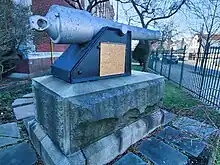
Hollis's public schools are operated by the New York City Department of Education. Hollis contains the following public elementary schools, which serve grades PK-5 unless otherwise indicated:[23]
The following public middle and high schools are located in Hollis:
Libraries
The Queens Public Library operates two branches in Hollis. The Hollis branch is located at 202-05 Hillside Avenue,[29] and the South Hollis branch is located at 204-01 Hollis Avenue.[30]
Transportation
Long Island Rail Road service is available at the Hollis station, located at 193rd Street and Woodhull Avenue; The station is served mostly by the Hempstead Branch.[31] West of Hollis station is the LIRR's Holban Yard, a freight yard that has been shared with St. Albans for over a century, and has included the Hillside Maintenance Facility since 1991. The MTA Regional Bus Operations’ Q1, Q2, Q3, Q36, Q43, Q76, Q77 and Q110 buses serve Hollis. The Nassau Inter-County Express’ n1, n6, n6X, n22, n24 and n26 service also stops at Hillside Avenue and Francis Lewis Boulevard, making drop-offs in the westbound direction and pick-ups in the eastbound direction.[32]
The New York City Subway's F and <F> train stop nearby at Jamaica-179th Street on Hillside Avenue.[32] The Archer Avenue lines were supposed to be extended to Hollis as part of Program for Action, a never-completed New York City Subway expansion in 1988.
Parks
Liberty Triangle Park
Liberty Rock is a boulder in Liberty Triangle park at the intersection of Farmers Blvd. and Liberty Ave.[33]
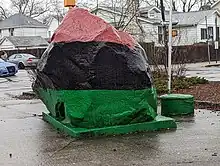
The Liberty Rock is a symbol of the history and culture of the African American community in St. Albans. The painting of the rock in red, black, and green, the colors of the Pan-African flag, represents the community's commitment to civil rights, group identity, and fostering ties between all people of African descent. The location of the rock, at the intersection of St. Albans, Hollis, and Jamaica, highlights its significance as a shared symbol for the entire community. The Liberty Rock serves as a symbol of resistance and resilience, reminding the community of its rich cultural heritage and ongoing struggle for equality and justice.[34] The Liberty Rock was originally erected as a World War II memorial in the late 1940s or early 1950s. It likely honored the soldiers who fought and died in the war. During his 1960 campaign JFK visited the 'Rock' on a whistlestop tour of Queens. In the late 1960s, residents Cassia Campbell and Porscha Williams, reported that eleven year old Tony Tims and Daniel Gibson were the only people there initially and Tims claimed “I used my father's paint, met Daniel. I would paint, he filmed it. I got the idea from a small rock that was painted Red, Black and Green in the square located at 122nd & Farmers Blvd, That's the real story.” Tims painted the rock red, black, and green to symbolize the Black Power and Pan-African movements. This act of community activism was a way for the residents to express their cultural pride and reclaim their community, which was facing challenges such as poverty, crime, and neglect.[35]
At the time, the Liberty Rock was located in a predominantly minority neighborhood and served as an eyesore and gathering place for winos across from a local liquor store. The residents decided to clean up the area, including the Liberty Rock, and paint it with the support of local businesses. The City of New York was initially opposed to the painted rock, but with the backing of the local store owners, the residents successfully challenged the city and kept the rock painted in the red, black, and green colors. However, the plaque honoring the war veterans was removed and placed elsewhere.[36]
Notable people
Since the beginning of hip-hop, the neighborhood has been a hotbed of talent, sparked primarily by the fact that hip-hop producer and icon Russell Simmons is from this community, as is his brother Joseph, who along with his friends Darryl McDaniels and Jason Mizell formed the rap group Run-D.M.C. (who had a hit with the seasonal song "Christmas in Hollis").
Other notable residents include:
- Augustus A. Beekman (1923-2001), New York City Fire Commissioner from 1978 to 1980.[37]
- Black, Rock and Ron
- Byron Brown (born 1958), mayor of Buffalo, New York.[38]
- Art Buchwald (1925–2007), political humorist.[39]
- Lord Burgess (1924–2019), songwriter[40]
- Jaki Byard (1922–1999), jazz musician[41]
- Increase Carpenter (1737-1807), Revolutionary War Minuteman served in the Jamaica militia, veteran of the Battle of Long Island. A member of the Association of the Sons of Liberty, a secret society united against the British crown and the Tea Tax Act, whose motto was "No taxation without representation!".[42][43]
- Gloster B. Current (1913–1997), former deputy executive director of the National Association for the Advancement of Colored People also the National Director of Branches and Field Administration of the N.A.A.C.P. during the Civil Rights Movement.[44]
- Roy Eldridge (1911–1989), jazz trumpeter[40]
- Lani Guinier (born 1950), civil rights legal scholar.[45]
- Brian Hardgroove, bass player with Public Enemy.[46]
- Roy Haynes (born 1925), jazz drummer[40]
- DJ Hurricane (born 1965), hip hop DJ, producer and rapper[47]
- Royal Ivey (born 1981), assistant coach for the Brooklyn Nets and formerly for the New York Knicks.[48]
- Ja Rule (born 1976), rapper[49]
- Irv Gotti (born 1970), hip-hop producer and founder of Murder Inc Records.
- Milt Jackson (1923–1999), jazz vibraphonist and drummer[40]
- Daymond John (born 1969), founder and CEO of FUBU.[50]
- LL Cool J (born 1968), rapper and actor
- Ed Lover (born 1963), actor, radio and television personality
- Robert O. Lowery Fire Marshal and First African-American Fire Commissioner, FDNY
- Gregory Weldon Meeks (born 1953), U.S. Representative for New York's 5th congressional district
- Lee Q. O'Denat, founder of World Star Hip Hop[51]
- Garrett Oliver (born 1962), brewer and beer author who has been the brewmaster at the Brooklyn Brewery.[52]
- Diane Patrick (born 1951), labor lawyer and former First Lady of Massachusetts (2007–2015)[53]
- Run DMC, Hip-Hop group
- Rev. Al Sharpton (born 1954), civil rights activist[54]
- Phil Schaap (1951–2021), jazz historian and broadcaster[55]
- Russell Simmons (born 1957), Co-founder of Def Jam
- Stephen A. Smith (born 1967), ESPN sports personality
- Andrew Young (born 1932), civil rights activist and former U.S. Ambassador to the United Nations
- Young MC, rapper
Hollis was also home to many African American jazz musicians by the 1950s according to The New York Times.[55][56]
See also
- Odd Fellows Windmill, formerly located in Hollis
References
- "NYC Planning | Community Profiles". communityprofiles.planning.nyc.gov. New York City Department of City Planning. Retrieved April 7, 2018.
- Table PL-P5 NTA: Total Population and Persons Per Acre - New York City Neighborhood Tabulation Areas*, 2010, Population Division - New York City Department of City Planning, February 2012. Accessed June 16, 2016.
- "NYPD – 103rd Precinct". www.nyc.gov. New York City Police Department. Retrieved October 3, 2016.
- Current City Council Districts for Queens County, New York City. Accessed May 5, 2017.
- "Who Gave Death Blow to Gen. Woodhull? Move to Clear 1776 Redcoat Hits Snag". The New York Times. Retrieved March 11, 2023.
- "DEALS ON LONG ISLAND; Buyers Get Homes in Hollis, Freeport and Flushing". The New York Times. Retrieved March 11, 2023.
- "DEATH OF JOHN KEENAN; Famous for Deal in Giving Broadway to a Traction Company DIES AT HOLLIS, LONG ISLAND His Work in Connection with Jacob Sharp Responsible for Getting the Much Coveted Franchise". The New York Times. Retrieved March 11, 2023.
- "LONG ISLAND HOMES ARE QUICKLY SOLD; Builders Report Fall Buying at the Highest Volume for Several Years NEW GROUPS ARE PLANNED Forest Hills, Bayside, Hollis, Jamaica ands Flushing Are Active Centers Selling Many Homes Building Operations Plans 143 New Homes". The New York Times. Retrieved March 11, 2023.
- "Large Tract Sold for Hollis Homes; Other Sections of Long Island Busy". The New York Times. Retrieved March 11, 2023.
- Table PL-P3A NTA: Total Population by Mutually Exclusive Race and Hispanic Origin - New York City Neighborhood Tabulation Areas*, 2010, Population Division - New York City Department of City Planning, March 29, 2011. Accessed June 16, 2016.
- "Jamaica and Hollis (Including Hollis, Jamaica, Jamaica Center, North Springfield Gardens, Rochdale, South Jamaica and St. Albans)" (PDF). nyc.gov. NYC Health. 2018. Retrieved March 2, 2019.
- "2016-2018 Community Health Assessment and Community Health Improvement Plan: Take Care New York 2020" (PDF). nyc.gov. New York City Department of Health and Mental Hygiene. 2016. Retrieved September 8, 2017.
- "New Yorkers are living longer, happier and healthier lives". New York Post. June 4, 2017. Retrieved March 1, 2019.
- "NYC-Queens Community District 12--Jamaica, Hollis & St. Albans PUMA, NY". Census Reporter. Retrieved July 17, 2018.
- "Hollis and Jamaica – DNAinfo.com Crime and Safety Report". www.dnainfo.com. Archived from the original on April 15, 2017. Retrieved October 6, 2016.
- "103rd Precinct CompStat Report" (PDF). www.nyc.gov. New York City Police Department. Retrieved July 22, 2018.
- "Engine Company 301/Ladder Company 150". FDNYtrucks.com. Retrieved March 7, 2019.
- "FDNY Firehouse Listing – Location of Firehouses and companies". NYC Open Data; Socrata. New York City Fire Department. September 10, 2018. Retrieved March 14, 2019.
- Finkel, Beth (February 27, 2014). "Guide To Queens Hospitals". Queens Tribune. Archived from the original on February 4, 2017. Retrieved March 7, 2019.
- "Jamaica, New York City-Queens, New York Zip Code Boundary Map (NY)". United States Zip Code Boundary Map (USA). Archived from the original on October 19, 2018. Retrieved March 12, 2019.
- "Location Details: Hollis". USPS.com. Retrieved March 7, 2019.
- "Jamaica/Hollis – QN 12" (PDF). Furman Center for Real Estate and Urban Policy. 2011. Retrieved October 5, 2016.
- Zillow. "Hollis New York School Ratings and Reviews". Zillow. Retrieved March 4, 2019.
- "P.S. 035 Nathaniel Woodhull". New York City Department of Education. December 19, 2018. Retrieved March 13, 2019.
- "P.S. 118 Lorraine Hansberry". New York City Department of Education. December 19, 2018. Retrieved March 13, 2019.
- "P.S. 134 Hollis". New York City Department of Education. December 19, 2018. Retrieved March 13, 2019.
- "I.S. 192 The Linden". New York City Department of Education. December 19, 2018. Archived from the original on October 21, 2020. Retrieved March 13, 2019.
- "P.S. Q233". New York City Department of Education. December 19, 2018. Retrieved March 13, 2019.
- "Branch Detailed Info: Hollis". Queens Public Library. Retrieved March 7, 2019.
- "Branch Detailed Info: South Hollis". Queens Public Library. Retrieved March 7, 2019.
- Hollis, Metropolitan Transportation Authority. Accessed March 31, 2017.
- "Queens Bus Map" (PDF). Metropolitan Transportation Authority. August 2022. Retrieved September 29, 2022.
- "Queens Public Library Digital". digitalarchives.queenslibrary.org. Retrieved March 11, 2023.
- "Saint Albans | History of Queens, NY". QNSMADE. Retrieved March 11, 2023.
- "Liberty Triangle Highlights : NYC Parks". New York City Department of Parks & Recreation. Retrieved August 11, 2023.
- "The oral history of Liberty Rock". queenscapes.nyc. December 27, 2018. Retrieved August 11, 2023.
- Fowler, Glenn. "A Cool Man to Handle Fires", The New York Times, January 18, 1978. Accessed July 27, 2018. "Shortly after he became a fireman, Mr. Beekman married the former Muriel Gittens, who grew up in the Bronx. They live in Hollis, Queens, and have a 23‐year‐old daughter, Bernadette, a Hunter College graduate, and two sons —Stephen, 21, who is studying at Queens College to be a teacher of the handicapped, and Arthur, 16. a member of the swimming team at St. Francis Preparatory School."
- Sondel, Justin. "From Queens to the Queen City: A Q&A With Byron Brown", City & State, May 5, 2015. Accessed June 16, 2016. "Buffalo Mayor Byron Brown grew up in Hollis, Queens, before he left for Buffalo State College, where his political career—which saw him go from the Common Council to the state Senate to the mayor’s office—began."
- Severo, Richard. "Art Buchwald, 81, Columnist and Humorist Who Delighted in the Absurd", The New York Times, January 18, 2007. Accessed June 16, 2016. "Arthur remained at the home until he was five. He and his father and sisters were eventually reunited and lived in Hollis, Queens."
- Tarek, Shams (January 31, 2003). "Celebrating Black History Month: History Makers That Have Made A Mark On Southeast Queens". Southeast Queens Press. Archived from the original on July 6, 2015. Retrieved July 5, 2015.
- Jacobs, Andrew, "Jazz Artist Jaki Byard Died of Bullet Wound", The New York Times, February 14, 1999. Accessed August 26, 2018.
- About Us, Increase Carpenter Chapter. Accessed August 29, 2022. "Increase Carpenter, the namesake of our chapter, was Quartermaster for the Continental Army, earned the rank of 1st Lieutenant in the Jamaica Militia, wore the uniform of the Jamaica Minuteman, served on the Committee of Correspondence, and served time as a prisoner of war. The family of Increase Carpenter owned the inn located in nearby Hollis, Queens, where a protest meeting of the Patriots of the American Revolution was held."
- Hirshon, Nicholas. 'It's a long battle for war hero sign", New York Daily News, September 28, 2010. Accessed August 26, 2018. "The state Education Department posted a cast-iron sign on Jamaica Ave. in Hollis in 1935 to note the important moment during the American Revolution. The inscription read, 'On Aug. 28, 1776, Gen. Nathaniel Woodhull was captured and fatally wounded by the British in Increase Carpenter's house 200 feet north of this spot.'"
- Van Gelder, Lawrence. "Gloster B. Current, 84, Leader Who Helped Steer N.A.A.C.P.",. The New York Times, July 9, 1997. Accessed July 27, 2018. "Gloster B. Current, former deputy executive director of the National Association for the Advancement of Colored People, died on Thursday at North Shore University Hospital-Cornell University Medical College in Forest Hills, Queens. Mr. Current, who lived in Hollis, Queens, was 84."
- Guinier, Lani. "Identity and Demography", The New York Times, March 25, 2013. Accessed June 16, 2016. "When my family moved to Hollis, Queens in 1956, the neighborhood changed with our arrival."
- Kong, Vince. "downtrodden", Albuquerque Journal, April 27, 2012. Accessed June 16, 2016. "Hardgroove, a native of Hollis, Queens, in New York City, relocated to Santa Fe in 2006 and has called New Mexico his home ever since."
- "Hip-Hop Icon DJ Hurricane to Release Don't Sleep on October 10; Former Beastie Boy DJ Dropping New Album on TVT Records", PR Newswire, September 26, 2000. Accessed November 8, 2016. "Born in Hollis, a suburb of Queens, New York, Hurricane started rhyming at age 11 and took credit for founding Hollis' first rap group the Solo Sounds, which morphed into the short-lived group The Afros (of 'Kickin' Afrolistics' fame.)"
- Kozikowska, Natalia. "NBA Guard Royal Ivey Returns to Hollis", Queens Tribune, August 29, 2013. Accessed June 16, 2016. "Last weekend, NBA point guard Royal Ivey returned to his hometown in Hollis to re-launch his annual three-day summer workshop, the 'Defending Your Dream' skills clinic."
- Feeney, Michael J. "Saddle River home is base for Ja Rule's new MTV reality series", The Record (Bergen County), November 7, 2015. Accessed November 8, 2016. "Atkins and his wife met as teenagers growing up in Hollis, Queens, and have been together ever since. As his career took off, they moved to West Orange, and then married in 2001 and moved to Saddle River."
- Clifford, Catherine. "Right as Shark Tank investor Daymond John became really rich, he lost everything", CNBC, November 22, 2016. Accessed July 27, 2018. "Daymond John was born in Brooklyn, New York, and he grew up in Hollis, Queens."
- Jacobson, Mark. "WorldStar, Baby!" New York Magazine. February 5, 2012. 2. Retrieved on November 2, 2012. Also available at General OneFile.
- Lee, Dion; McCarron, Meghan; and Kim, Halim. "Garrett Oliver Wants You to Follow Your Dreams; How the brewmaster of Brooklyn Brewery found the thing that put fire in his eyes.", Eater, June 16, 2016. Accessed August 26, 2018. "Garrett Oliver describes his upbringing in Hollis, Queens, in the 1960s as surprisingly 'Victorian.'"
- "Diane B. Patrick Biography". The HistoryMakers. September 12, 2019. Archived from the original on February 13, 2022. Retrieved February 19, 2022.
- Andrews, Suzanna. "Everything Al Sharpton Has Lived for Is at Stake This November", Vanity Fair (magazine), March 31, 2016. Accessed November 8, 2016. "When Sharpton was five, the family moved from Brooklyn to the leafy middle-class neighborhood of Hollis, Queens, where they owned a house with a yard, and Sharpton’s father bought two Cadillacs every year, one for himself and one for his wife."
- Kilgannon, Corey (May 27, 2001). "In a Life of Jazz, a Jarring Note". The New York Times. Retrieved September 9, 2021.
- Sengupta, Somini (September 20, 1998). "Where Jazz Put Its Feet Up; Many Black Musicians Made Their Homes in Queens". The New York Times. Retrieved April 1, 2016.
